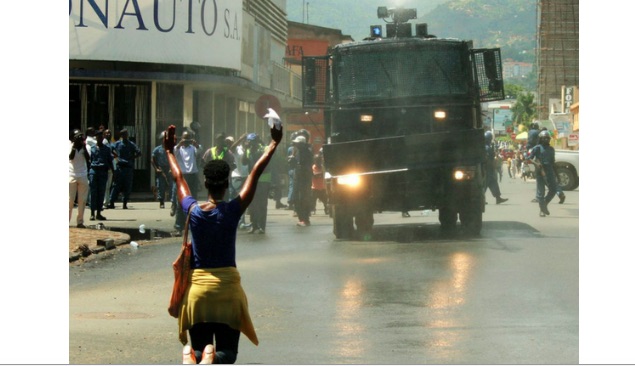. . WOMEN’S EQUALITY . .
An article from the Nobel Women’s Initiative
Activist and poet. Ketty’s leadership in mobilizing women in protest against her country’s government led her to flee from persecution, to Canada. As a refugee, Ketty continues to be a voice for peace and rule of law in her country –Burundi–and regularly speaks on human rights, refugee issues, and the intimate effects of conflict on women’s lives globally. Ketty has recently joined the staff of the Nobel Women’s Initiative as Media Associate.

For some of our readers who may not know the conflict in Burundi, could you explain the current situation?
Burundi has undergone a lot of conflict in the past four decades. We experienced a peaceful period in the 2000s, but in 2015, the head of state decided to run for a third and unconstitutional term in office. So that was the beginning of a political crisis, and many citizens responded with peaceful protests. However, the regime repressed them through massive human rights violations.
How did you become an activist?
I became involved early on in Burundi’s current crisis when I realized that women’s voices were not being heard. I could see that if it continued, women, as usual, would be the first victims of the conflict. It was important that we send a message of peace, so I led our first women-only peaceful protest in Burundi. It was a very powerful, historic, feminist moment because not only did we take ownership of our voices, but we also gained confidence in a country that is traditionally very patriarchal. For my actions, the state targeted me and I had to flee the country.
How has your activism had to evolve since you were forced to leave Burundi?
I’m an artist before anything else: a writer and a poet. But as a result of the conflict, I find that my focus has turned to activism, or ‘artivism’. As a founding member of the Women and Girls Movement for Peace and Security, I remain active in the movement, mainly by advocating for women’s representation at the peace negotiation table and by researching cases of sexual violence and human trafficking perpetrated by Burundian state actors. It’s important to collect credible data on what’s happening to our women and girls. I also continue to lobby and raise awareness on the crisis. I testified before the Canadian parliamentary committee on international human rights, and speak regularly at other forums on the situation of women and girls in Burundi.
(Article continued in right column)
Can the women of Africa lead the continent to peace?
Do women have a special role to play in the peace movement?
(Article continued from left column)
What role does art play in your activism?
I think it was Alice Walker who said that “art is the mirror, perhaps the only one in which we can see our true collective face”. Art is indeed our mirror. It enables me, as an artist, to keep my ear on the ground, to remain close to the truth of what is happening. My poetry has always been infused by what is happening in my community. It’s powerful, not only to send a message but also to depict what is difficult to capture otherwise, especially in situations of injustice and oppression. Poetry gives me a lot of creative freedom to address the social and the political pitfalls of my society. So that’s one aspect—the mirroring aspect. The other aspect is that art, I believe, also heals. Sometimes when there are no clear answers amidst so much violence, art can be space of solace and healing. Sometimes art is the only way to reach people’s souls.
What inspires you to keep going and to keep doing this work?
I cannot tolerate injustice, and I’ve been this way since I was a little girl. I see doing this work as my duty as a human being—I don’t see any other option. Not addressing the issues that are ailing my community and my society is another form of dying—a more severe death, I would say. It’s a duty that I must do in order to sleep at night, in order to look at myself in the mirror. I am currently safe, but if I am enjoying my safety alone while millions of my country-mates or anyone else, anywhere else in the world, is not safe, then that affects my peace. So doing this work is a way of life.
Do you have any final thoughts you’d like to share?
I believe we all hear a calling inside of us to give our life a broader dimension than our individual journeys, and I want to encourage us to listen to that voice. Most of the time, we are afraid to act because it means losing a lot of our acquired comforts. As someone who has lost a lot, I want to say that I found greater purpose and meaning, and my life has never been richer. So my words would be to encourage anyone who hears that calling not to be afraid and to go out there and do what they are called to do. It cannot only be the work of a few people we highlight and profile. We must all do the work to get to our shared humanity to a better place.
we seek freedom
like yellow diamonds
through dust
through stone
our naked hands
bleed on rocks
we breathe in coal
but exhale hope
– Ketty Nivyabandi
(Thank you to Janet Hudgins, the CPNN reporter for this article)